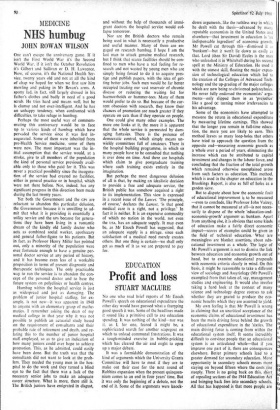EDUCATION.
Profit and loss
STUART MACLURE
No one who read brief reports of Mr Enoch Powell's speech on educational expenditure the other day would have guessed what a thurraiping good speech it was. Some of the headlines made it sound like a primitive call to axe education spending. It was nothing of the kind—nor was it, as I, for one, feared it might be, a sophisticated search for another scapegoat on which to unload communal frustrations. It was a tough-minded exercise in bubble-pricking which has cleared the-air and ought to open up a major debate.
It was a formidable demonstration of the kind of arguments which the University Grants Committee will have to meet if they are to make out their case for the next round of Robbins expansion when the present quinquen- nium comes to an end in four years' time. But it was only the beginning of a debate, not the end of it. Some of the arguments were knock- down arguments, like the ruthless way in which he dealt with the thesis—advanced by many reputable economists in the United States and elsewhere—that investment in education is 'an indispensable ingredient' of economic growth. Mr Powell cut through this—dismissed it as 'bunkum'—but it won't lie down as easily as that. Lord (then Sir David) Eccles is the man who unleashed it in Whitehall during his second spell at the Ministry of Education. He used it with the utmost skill, floating the major expan- sion of technological education which led to the creation of the Colleges of Advanced Tech- nology and the up-grading of the major colleges which are now being re-christened polytechnics. He never fully endorsed the economists' argu- ments—only slipped them in as 'prejudice' like a good QC turning minor irrelevancies to his advantage.
Some of the economists have attempted to measure the return in educational expenditure by measuring lifetime earnings. This showed that the longer you remain in full-time educa- tion, the more you are likely to earn. This method leaves so many loop-holes that others have tried to approach the question from the opposite end—measuring economic growth as a whole over a period of years, eliminating the increase which can be attributed to capital investment and changes in the labour force, and concluding that the fraction of the total growth which remained otherwise unexplained arose from such factors as education. This method, which is used in the chapter on education in the Brookings Report, is also as full of holes as a garden sieve.
But to dispute about how the economic fruit of educational improvement is to be measured —even to conclude, like Professor John Vaizey, that it cannot be measured at all—is not neces- sarily to dispose of the whole 'education-and- economic-growth' argument as bunkum. Apart from anything else, it is obvious that some kinds of education make a fairly direet economic impact—scores of examples could be given in the field • of technical education.. What are meaningless are blanket assertions about edu- cational investment as a whole. The logic of Mr Powell's argument is not to dismiss the link between education and economic growth out of hand, but to examine educational proposals with economic criteria clearly in mind. On this basis, it might be reasonable to take a different view of sociology and Assyriology (Mr Powell's examples) from that taken of, say, management studies and engineering. It would also involve taking a hard look at the content of many science and technology degree courses to ask whether they are geared to produce the eco- nomic benefits which they are assumed to yield.
My own feeling is that Mr Powell is wrong in claiming that an uncritical acceptance of the economic claims of educational investment has been the main driving force behind the growth of educational expenditure in the 'sixties. The main driving force is coming from within the educational system itself. It seems incredibly difficult to convince people that an educational' system is an articulated whole—that if you, improve one part of it, there are consequences elsewhere. Better primary schools lead to a greater demand for secondary education. More opportunity in secondary schools means More staying on beyond fifteen where the costs )1se steeply. There is no going back on this, Wort of repealing sections of the 1944 Education Act and bringing back fees into secondary schools. All that has happened is that more people are
conforming to what used to be regarded as middle class educational patterns.
The rising demand for higher education has crown out of this. It is far too simple to think in terms of just screwing down the lid, while at the same time stoking up the fire under the pot. If there is one thing which would really ruin sixth form education it would be indiscriminate cuts in university expansion. More to the point would be to follow up Mr Powell's suggestion that 'a large and growing proportion of further and university education . . . could be self- financed and self-determined'----which presum- ably means letting those sectors of higher edu- cation which promise a clear economic return fend for themselves in the market place. With this could go an investigation of the part which private financial institutions could play in advancing part, at least, of students' costs, which would ensure that expansion took place where the economic return was sufficiently clear to convince borrowers and lenders alike.
Next year, public education faces its worst financial crisis since 1931. There is no doubt about the urgency of the debate. Mr Powell has done his bit by getting it started. Now it is up to Mr Short or one of his numerous col- leagues at Curzon Street to take up the argument.







































 Previous page
Previous page